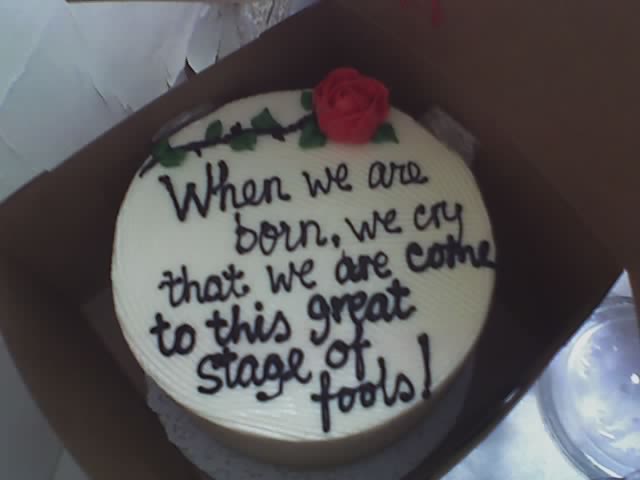Ironically, the title character in what many consider to be Shakespeare’s central dramatic work is most famous for his long speeches. One speech in particular stands out as almost interchangeable with Shakespeare and perhaps even the theatre as a whole. The soliloquy manages to sum up, in just thirteen letters, the fundamental question of existence itself. Once we agree to tackle that question, then the rest of the speeches, well, they may as well just be anagrams of the big one…
From Hamlet:
To be, or not to be: that is the question:
Whether ’tis nobler in the mind to suffer
The slings and arrows of outrageous fortune,
Or to take arms against a sea of troubles,
And by opposing end them? To die: to sleep;
No more; and, by a sleep to say we end
The heart-ache and the thousand natural shocks
That flesh is heir to, ’tis a consummation
Devoutly to be wish’d. To die, to sleep;
To sleep: perchance to dream: ay, there’s the rub;
For in that sleep of death what dreams may come
When we have shuffled off this mortal coil,
Must give us pause. There’s the respect
That makes calamity of so long life…
Shift around the letters, and it becomes:
O! that this too too solid flesh would melt,
Thaw and resolve itself into a dew;
Or that the Everlasting had not set
His precept ‘gainst self-slaughter! Rebuke! Rebuke!
How weary, foul, puffed, and abominable
Seem to me the questions of this place.
Fie on ‘t! O fie! ’tis a once heeded garden,
That’s left to pot; the rank and weed in nature
Possess it merely. But he should come to this!
Not four months dead: nay, half as much, but two:
As superior a man; so as, to this step,
Hyperion to a satyr; so caring to my mother
Permit he not beteem the beams of stars
Access her face too roughly. Heaven and earth!
You can compare it to the original speech here (starting at line 133).
Shift around the letters again, and it becomes:
I have of late, – but wherefore do not seek, – lost all my cheer, ashamed that the oddest mood upsets me so seethingly that our lush frame, at the earth, soon seems to me a detested sterile promontory; this aesthetic roof toasted by stoked mythical golden fire truthfully appears to me therefore as such a both foul and pestilent congregation of bath vapours. What a piece of work is man! How noble in reason! in theme, how impressive and truthful! in action as an angel! and apprehension as a god! the beauty of the world! the crest of beasts! But, to me, what is this quintessence of dust?
You can compare it to the original speech here (around line 250).
Shift around the letters again, and it becomes:
O! what a rogue and peasant slave am I:
Is’t not monstrous that this player here,
Could force his soul so to the best esteem
That from her working feebled all his looks,
Have tears in eyes, add a tempest of bombasts,
A broken voice, and his whole function suiting
With forms to top esteem? and all for nothing!
Frets Hecuba to him for he to tear
That he so pretty sobs? What would he do
Had he not the uttermost cue for passion
As by me? He could drown the stage in tears,
Atone the guilty and appal the free,
Confound the temperate, and to quite impress
The seemly faculties of eyes and ears.
You can compare it to the original speech here (starting at line 382).
Shift around the letters again, and it becomes:
How all occasions do inform against me,
And spur my dull revenge! What’s a man,
If his chief hope and market of his time
Be but to sleep and feed? a helpless beast, thou.
Sure he that made us with much large esteem,
He looked from before to after, gave unto us not
That potential and smoothest reason
To fust in us effetely. Whe’r it be
Bestial petty sloth, or some softer scruple
To foresee too precisely on a theme,
A knot, which, quarter’d, hath but one part hero,
And also three parts coward, I see not
Why yet I be to say ‘This thing’s to do;’
Sith I have cause and lots of strength and means
To do ‘t.
You can compare it to the original speech here (starting at line 37).
Shift around the letters again, and it becomes:
Alas! poor Yorick. I knew him, Horatio; a fellow of endless mirth, of most splendid fancy; he hath paraded me on his shoulders a thousand separate times; and now too detested in the greatest depths of my imagination it is! Here hung those lips that I have oft kissed. When be you at fatuous gibes? at gambols? at accents? at those deftest flashes of espoused merriment, that were wont to burst the tables on a roar? But not one to be sped now, to renounce reverence? quite chapfallen? Foot you to my lady’s chamber, tell her, let her protest, of this favour she must come; see her laugh at that.
You can compare it to the original speech here (starting at line 80).

